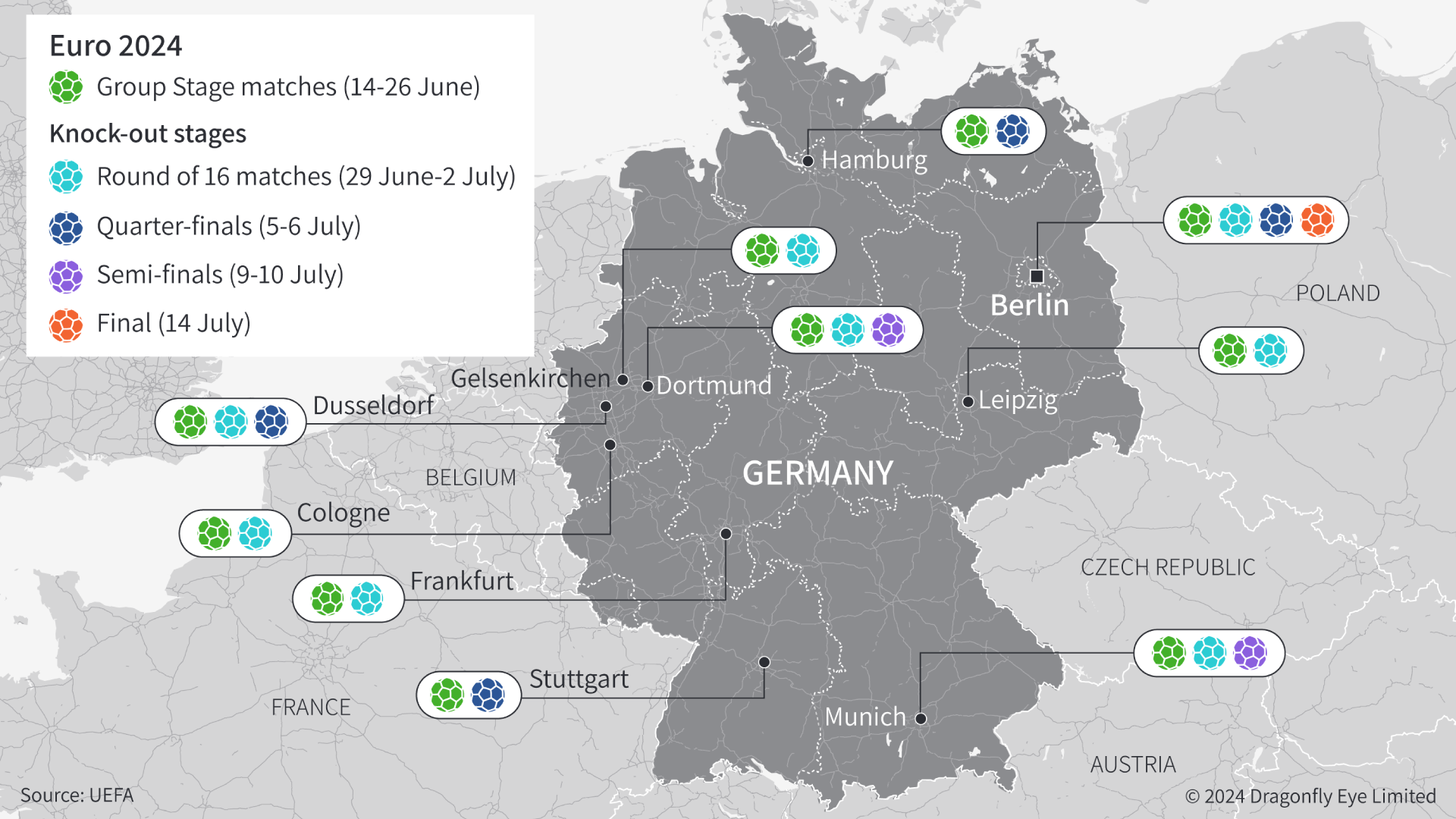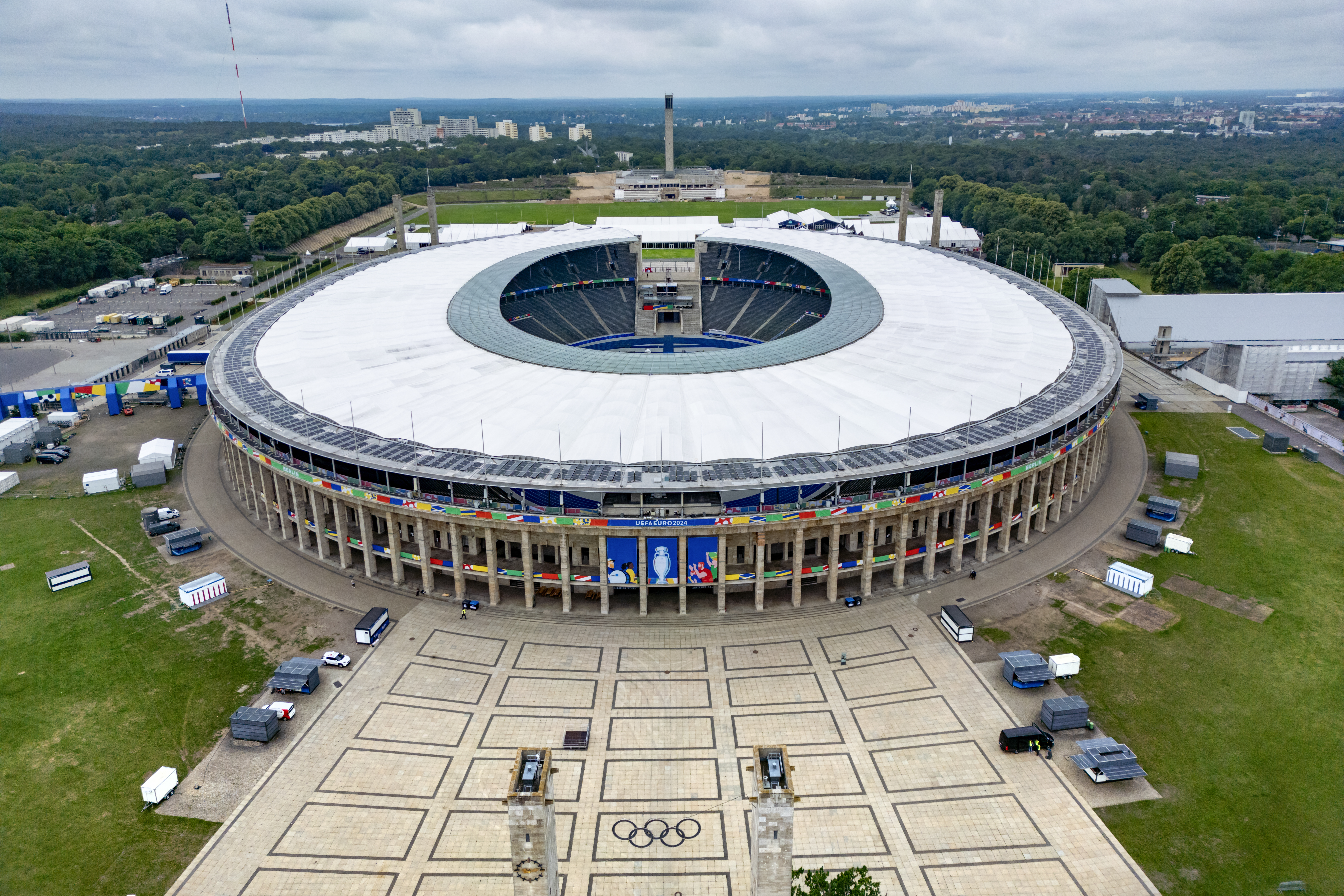Widespread travel disruption, including traffic and public transport congestion, is likely to be the main operational impact of Euros 2024 events which are being held from 14 June-14 July in several cities, including Berlin.
This assessment was issued to clients of Dragonfly’s Security Intelligence & Analysis Service (SIAS) on 06 June 2024.
- Terrorism, hooligans, violent crime and cyber attacks seem to be the main focus of the authorities, who have implemented significant security measures
- We assess that public viewings of matches in city centre squares and venues are particularly vulnerable targets for terrorists
Major security incidents affecting the UEFA 2024 European Football Championship (‘the Euros’) from 14 June to 14 July are unlikely, in our assessment. The German security services have been working with law enforcement bodies across Europe, including Europol, as the authorities prepare to welcome fans, officials and broadcasters from across the world. No major foreign government has officially warned about security risks for attendees, beyond keeping valuables safe.
Nonetheless, the authorities in Germany are almost certainly taking precautions to mitigate a variety of security threats around the tournament. The interior minister said this week that their ‘focus ranges from the threat of Islamist terror, hooligans and other violent criminals to cyber-attacks’. Other key issues that would impact travellers to the tournament or day-to-day business operations include widespread travel disruption, road traffic congestion, and sporadic bouts of fighting between fans and activism.
Major security measures in place
The authorities are likely to be able to prevent high-impact security events around the Euros. They appear to have gone to significant lengths to do so. This includes:
- Inviting hundreds of security experts from participating countries to help monitor proceedings
- Stepping up border checks into Germany from early June, in collaboration with the authorities of neighbouring and transit countries
- Deploying the army to monitor local airspace during the tournament
- Establishing zones in which drone flights are heavily restricted
- Stepping up police presence on trains, and in train stations and airports
The biggest day-to-day operational impact during the tournament is likely to be disruption to traffic and crowds on public transport. This will extend far beyond just the stadiums where matches are taking place; the tournament’s head of security has said that no vehicles will be allowed near the arenas, with security cordons set up to check vehicles, bags and tickets. Fans will make the final part of their journey to matches using public transport. And tens of thousands of people will probably travel to attend public ‘fan zones’ for live match viewings in city centres.

The key aim of these measures seems to be to secure arenas by making it as difficult as possible to enter with weapons. Because of those measures high-impact terrorist attacks are unlikely to occur in or around stadiums themselves. And ‘simulations’ of potential security incidents have been taking place at stadiums across Germany since March, with the aim of ensuring the efficiency of any emergency response should an attack occur. As such the security forces would be very likely to respond quickly to contain any security incidents in and around arenas.
Fan zones more exposed than stadiums
Tens of thousands of people are also likely to gather in host cities regardless of whether or not they have a ticket. This will particularly be the case for the knock-out stages of the tournament, which begin on 29 June in several of the host cities, until the final in Berlin on 14 July. There will almost certainly be large crowds in city centres and congestion on public transport and at airports throughout the tournament. See the map for more details on scheduling for the knock-out stages of the tournament.
Gatherings of large numbers of people in city centres on match days are appealing targets for petty criminals. This includes outdoor screenings in central squares and official fan zones. Our general crime risk rating for Germany is low, but we assess that pickpockets and bag snatchers would try to take advantage of the large crowds, including queues at official venues such as fan zones. But we doubt such incidents would escalate to violence, particularly with the heightened security force presence in cities. UEFA has released a list of the largest official planned fan zones here (under ‘Festivals’).
Terrorism threat severe
Terrorists also probably view such large crowds in city centres as attractive targets. Jihadists online have already indicated an intent to target the Euros in their propaganda and messaging. On 7 May, for example, an outlet known for being pro-Islamic State Khorasan called for attacks on the championship, including on unspecified sites in Berlin, Munich and Dortmund. But such outlets have for several months been making similar threats online around other events, including UEFA Champions League matches, which have so far passed without any major security terrorism-related incidents.
Protests unlikely to pose security concerns
We have not seen information to suggest that any organisations or movements are planning to hold disruptive protests around Euro 2024 events. Still, there is some precedent for environmental activists targeting high-profile sporting events; Letzte Generation, for example, threw orange paint across the path of participants running the Berlin Marathon in 2022 and ran onto the pitch during an international football match in Germany last year. The level of publicity around the Euros is likely to make the tournament a target for environmental and pro-Palestine activists.
But at the Euros, it appears near-impossible for individuals to get onto pitches or into arenas without a ticket, or without being searched by security. So while it is probable that some activists have bought tickets specifically to stage protests, the chances of larger disruptive stunts, such as paint-throwing or chaining themselves to fences or goalposts, are low.
Protest stunts involving a few fans holding flags or storming the pitch are more likely than not, however. This is particularly the case for events in support of Palestine. There have already been such incidents at football games recently; on 25 May, protesters holding Palestinian flags ran onto the pitch at the women’s UEFA Champions League Final in London. Flags conveying political messages are banned at UEFA events but are quite easy to bring into arenas undetected.
Cybercriminals likely to target tournament
Cybercriminals plausibly view the Euros as an opportunity to mount operations. A study by Microsoft last year said that sporting events are vulnerable to hostile cyber operations. A manager at Microsoft Security Research said at the time that during the football World Cup in Qatar in 2022, the company observed attackers ‘continually’ attempting to compromise systems through ‘identity-based attacks’. In recent years, cybercriminals have:
- Targeted sports teams with ransomware attacks ahead of events
- Stolen personal data from third-party ticket vendors
- Carried out ticketing scams and spear-phishing campaigns against fans
State actors are also probably intent on targeting the event. That includes Russia since it has been banned from the event. And Fancy Bear, a Russia-linked hacking and cyber espionage group, targeted the 2018 Winter Olympics in South Korea, according to cybersecurity news outlets. They registered false domains that imitated official Olympics-related entities and sent spear-phishing emails to several organisations in the winter sports sector. But most international news reporting and official statements in recent years have focused on the threat from cybercriminals motivated by financial gain.
Image: The Olympic Stadium that will host several matches and the final of the UEFA EURO 2024 European Football Championship, on 4 June 2024, in Berlin, Germany. Photo by Odd Andersen/AFP via Getty Images.




